Divine Liturgy for the coming week
Christ is born!
Sunday, 1/13, Sunday after Theophany —the Holy Martyrs Hermylus and Stratonicus
9:00 a.m. +Wasyl Jureczko (40 days)
10:30 a.m For the people of the parish
Epistle: Ephesians 4:7-13
Gospel: Matthew 4:11-21, Tone 7
Monday, 1/14, Leave-taking of the Feast of the Holy Theophany; Our Venerable Fathers Massacred in Sinai and Raithu
9:00 a.m. God’s blessing and health for Maria Wysowskyj requested by Sestretsi
Tuesday, 1/15, Our Venerable Fathers Paul of Thebes and John the Hut-Dweller
9:00 a.m. +Ivan and Halyna Lobay requested by Maria Lobay
Wednesday, 1/16, The Veneration of the Precious Chains of the Holy and Illustrious Apostle Peter
9:00 a.m +Helen Wasylyk requested by Sestretsi
Thursday, 1/17, Our Venerable and God-bearing Father Anthony the Great
9:00 a.m. God’s blessing and health for Dr. Ckrha and Dr. Lori Rha
Friday, 1/18, Our Holy Fathers and Archbishops of Alexandria Athanasius and Cyril
9:00 a.m. +Vira Walnycky (Pan.) requested by UWLA Branch 108
Saturday, 1/19, Our Venerable Father Macarius of Egypt
9:00 a.m. +Wasyl Jureczko (Pan.) requested by UWLA Branch 108
Sunday, 1/20, 35th Sunday after Pentecost —Our Venerable and God-bearing Father Euthemius the Great
10:30 a.m. For the people of the parish
Epistle: Colossians 3:12-16
Gospel: Luke 18:18-27, Tone 8
Parish announcements this week
Christ is in our midst!
WELCOME NEW PARISHIONERS! New parishioners are always welcomed in our parish. If someone wants to register with our parish please contact Father Iura Godenciuc at (203) 865-0388 or our financial secretary Natalia Chermak.
VIGIL LIGHT: This week vigil light is offered to God’s greater glory by Chris Komondy for all the deceased of Komondy family.
Events
UKRAINIAN AMERICAN VETERANS: The next meeting of the UAV Post 33 will be held on January 20. The meeting will be held in Classroom 2.
The Ukrainian National Women’s League of America Branch 108 New Haven and St. Michael Parish will be preparing a Prosphora, a traditional Ukrainian Christmas meal, on Sunday, January 20 after the only one (1) Divine Liturgy at 10:30. Tickets are $20.00 for adults, free for students Ridna Shkola and altar boys. We will be running a raffle. Please donate items for raffle and cakes for desert. Tickets are on sale in the church hall every Sunday after both Divine Liturgies. You can buy tickets from Luba Dubno or members of UWLA Branch 108. Please buy tickets in advance.
SOROKOUSTY will be celebrated on All Souls’ Saturdays, February 23rd, March 16th, March 23rd, March 30th, and June 8th. Please take a book found in the entrance of the church, fill it out, place it in envelope, and drop it in the collection basket.
Needs
If someone would like to buy a frozen pierogies (varenyky) during the week please call the rectory at (203) 865-0388.
The organizational meeting of the newly formed Facilities Maintenance Team of St. Michael’s Ukrainian Catholic Church will take place on Friday evening, January 18th starting at 6:30 p.m. During this meeting, the team will discuss what maintenance or repair projects will be worked on during this New Year. The schedule of work sessions will also be established for the entire year so that plans can be developed for doing all the projects and arrangements made for the purchase of required supplies and equipment.
Once the projects have been determined and prioritized, the group will spend the rest of this “meeting” beginning to work on the first project. The usual time frame for the work sessions will run from 6:30 to about 9:30 p.m. There will be occasions when it is necessary to work later than 9:30 to complete some of the projects.
Sviatoslav on Andrey Sheptytsky
Thought you’d be interested in reading this interview with His Beatitude Sviatoslav. In particular, he says a few words at the end about our KofC Council’s patron, Metropolitan Andrey Sheptytsky. Thanks to John Burger for highlighting this interview.
The Seal of the Gift of the Holy Spirit
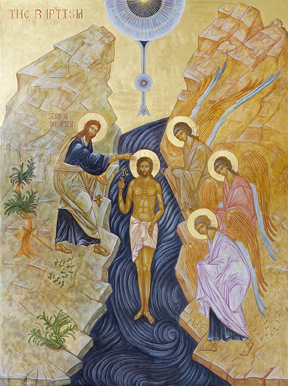 The feast of Theophany is not only about baptism in water, but about the gift of the Holy Spirit. The Kontakion declares, “You have revealed yourself to the world today; and your light, O Lord, has set its seal on us.” When we enter into the life of the Trinity, we receive the gift of the Spirit as the priest anoints us with the words, “the seal of the gift of the Holy Spirit.” We find this phrase in the Epistle of St. Paul to the Ephesians, “In [Christ] you also, who have heard the word of truth, the gospel of your salvation, and have believed in him, were sealed with the promised holy Spirit, which is the first installment of our inheritance toward redemption as God’s possession, to the praise of his glory” (1:13-14). Today in the Church, there is a movement called the “charismatic movement.” It wants to re-emphasize that all who have been baptized into Christ have received the gift of the Holy Spirit. This manifests itself in different ways according to our individual talents. On the Sunday after Theophany, St. Paul says, “And he gave some as apostles, others as prophets, others as evangelists, others as pastors and teachers, to equip the holy ones for the work of ministry, for building up the body of Christ, until we all attain to the unity of faith and knowledge of the Son of God, to mature manhood, to the extent of the full stature of Christ” (Ephesians 4:11-13).
The feast of Theophany is not only about baptism in water, but about the gift of the Holy Spirit. The Kontakion declares, “You have revealed yourself to the world today; and your light, O Lord, has set its seal on us.” When we enter into the life of the Trinity, we receive the gift of the Spirit as the priest anoints us with the words, “the seal of the gift of the Holy Spirit.” We find this phrase in the Epistle of St. Paul to the Ephesians, “In [Christ] you also, who have heard the word of truth, the gospel of your salvation, and have believed in him, were sealed with the promised holy Spirit, which is the first installment of our inheritance toward redemption as God’s possession, to the praise of his glory” (1:13-14). Today in the Church, there is a movement called the “charismatic movement.” It wants to re-emphasize that all who have been baptized into Christ have received the gift of the Holy Spirit. This manifests itself in different ways according to our individual talents. On the Sunday after Theophany, St. Paul says, “And he gave some as apostles, others as prophets, others as evangelists, others as pastors and teachers, to equip the holy ones for the work of ministry, for building up the body of Christ, until we all attain to the unity of faith and knowledge of the Son of God, to mature manhood, to the extent of the full stature of Christ” (Ephesians 4:11-13).
The Spirit is given so that Christ may live in us according to fullness. When Communion is distributed, the Body and Blood of Christ are united in the cup with the words, “The fullness of the Holy Spirit.” Why are these charisms, these spiritual gifts, not more evident today? Perhaps it is because we are not as open to hearing the Spirit within us, there is too much individualism and pride. The Spirit is given that we might support one another in community, the Spirit does not support our own ideologies, but the truth of God. The words of the gospel and the teaching of the Church cannot contradict the Spirit, but we sometimes give them our own interpretations. The Spirit truly guides us to truth, as Jesus promised, “when he comes, the Spirit of truth, he will guide you to all truth” (John 16:13). However, we must not hear what we “want to hear,” nor the echo of our own thoughts, but only the working of the Holy Spirit, leading us to the Father through Christ.
Great Blessing of Water on Theophany
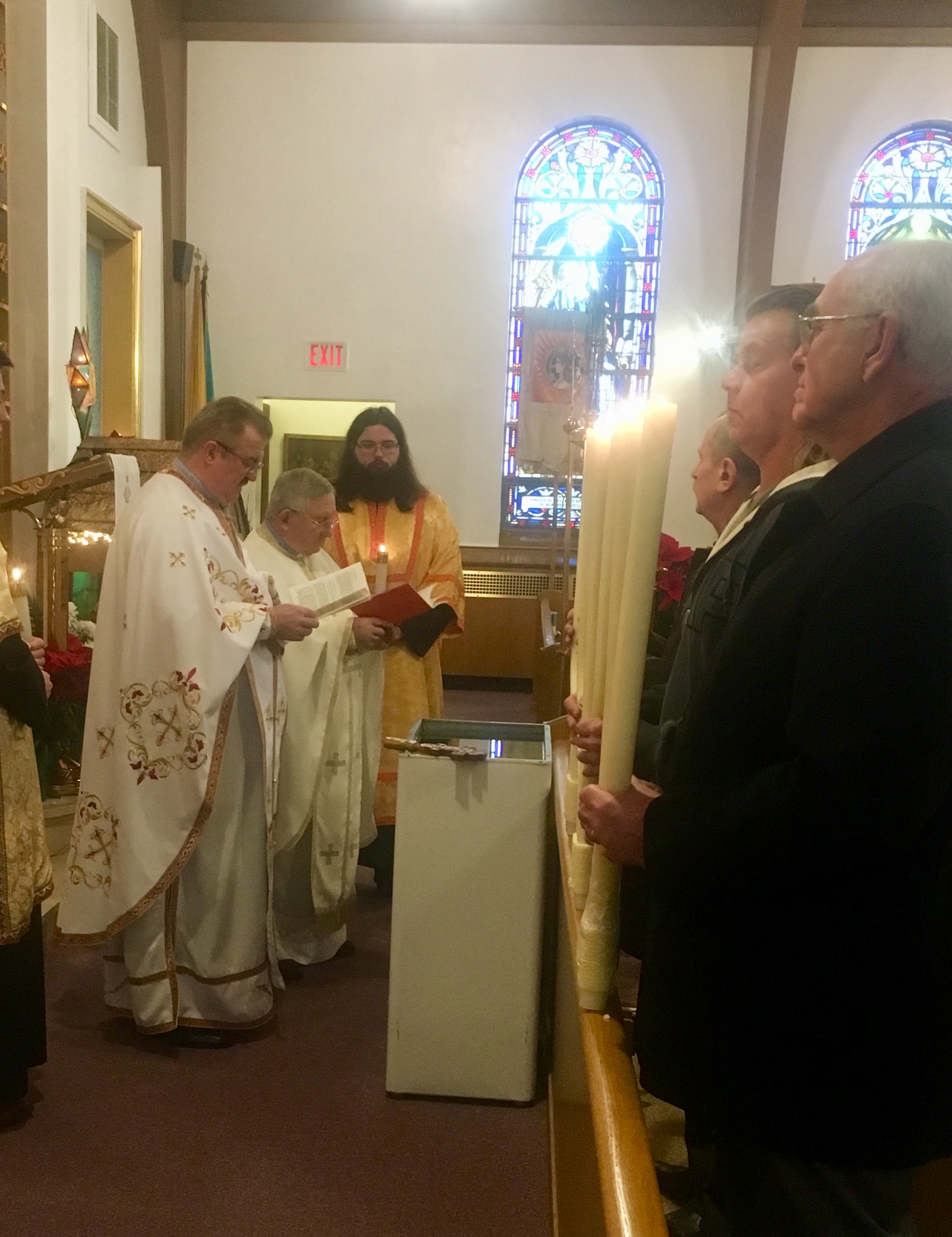 Father Iura prayed the prayers for the Great Blessing of Water on Theophany (Jan. 6, 2019) with Father Stepan concelebrating.
Father Iura prayed the prayers for the Great Blessing of Water on Theophany (Jan. 6, 2019) with Father Stepan concelebrating.
“The voice of the Lord upon the waters cries aloud saying, “Come you all, and receive the Spirit of wisdom, the Spirit of understanding, the Spirit of the fear of God, from Christ who is made manifest. Today the nature of the waters is sanctified, and the stream of its own waters, seeing the Master being baptized.”
The Holy Theophany is yet another feast of the Nativity and the beginning of the ministry of the Lord with his baptism in the Jordan.
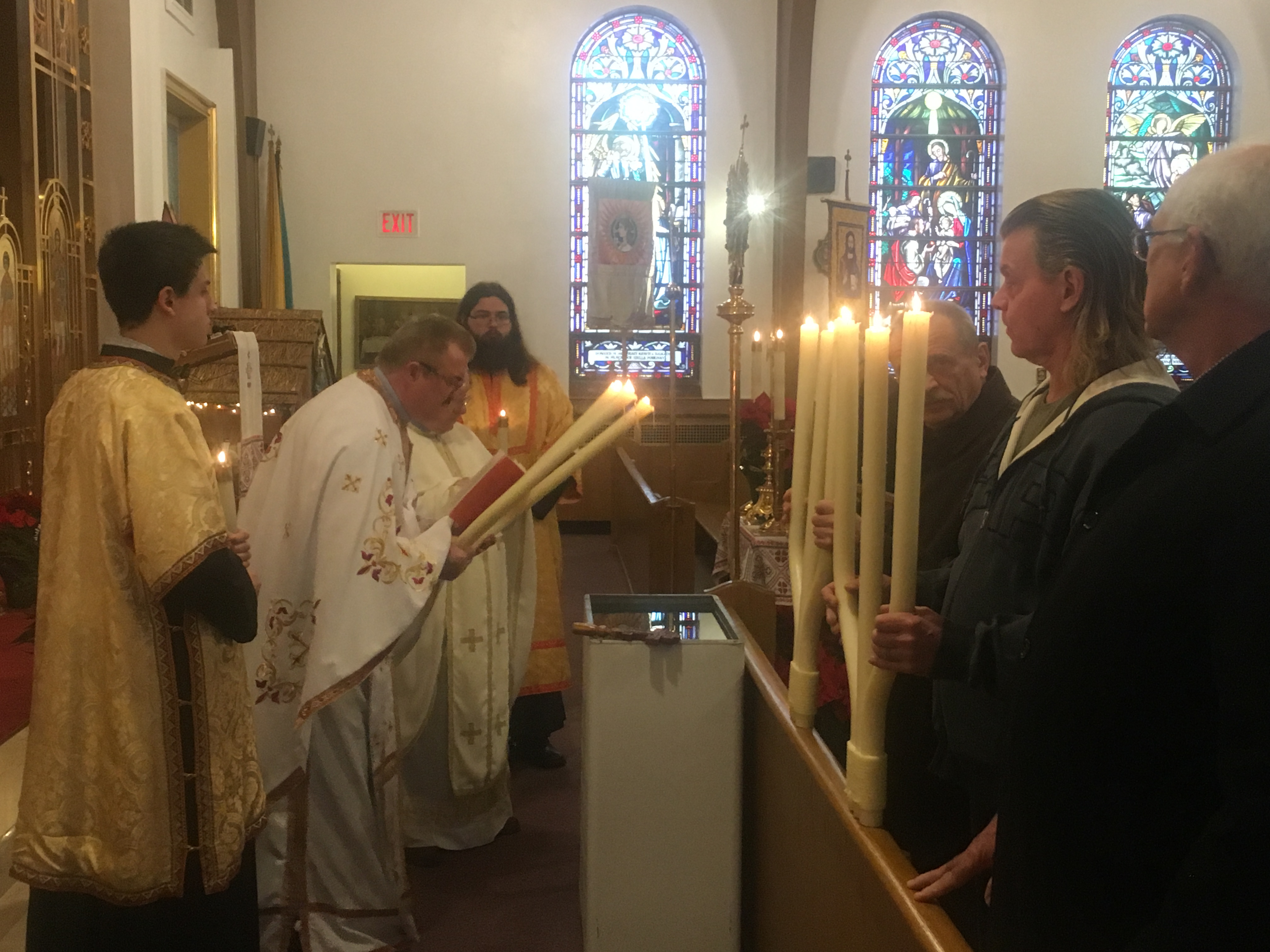 Striking is the theology used in the prayers that through the waters we are given the grace of redemption, … that Satan be swiftly crushed beneath our feet and that every counsel that is directed against us by the Evil One may be made of no effect, … that we may be enlightened by the light of knowledge and godliness through the descent of the Holy Spirit, … that the blessed water be an instrument of a remission of sins, for the healing of soul and body and for every purpose that is expedient… and be a fountain springing us into eternal life.
Striking is the theology used in the prayers that through the waters we are given the grace of redemption, … that Satan be swiftly crushed beneath our feet and that every counsel that is directed against us by the Evil One may be made of no effect, … that we may be enlightened by the light of knowledge and godliness through the descent of the Holy Spirit, … that the blessed water be an instrument of a remission of sins, for the healing of soul and body and for every purpose that is expedient… and be a fountain springing us into eternal life.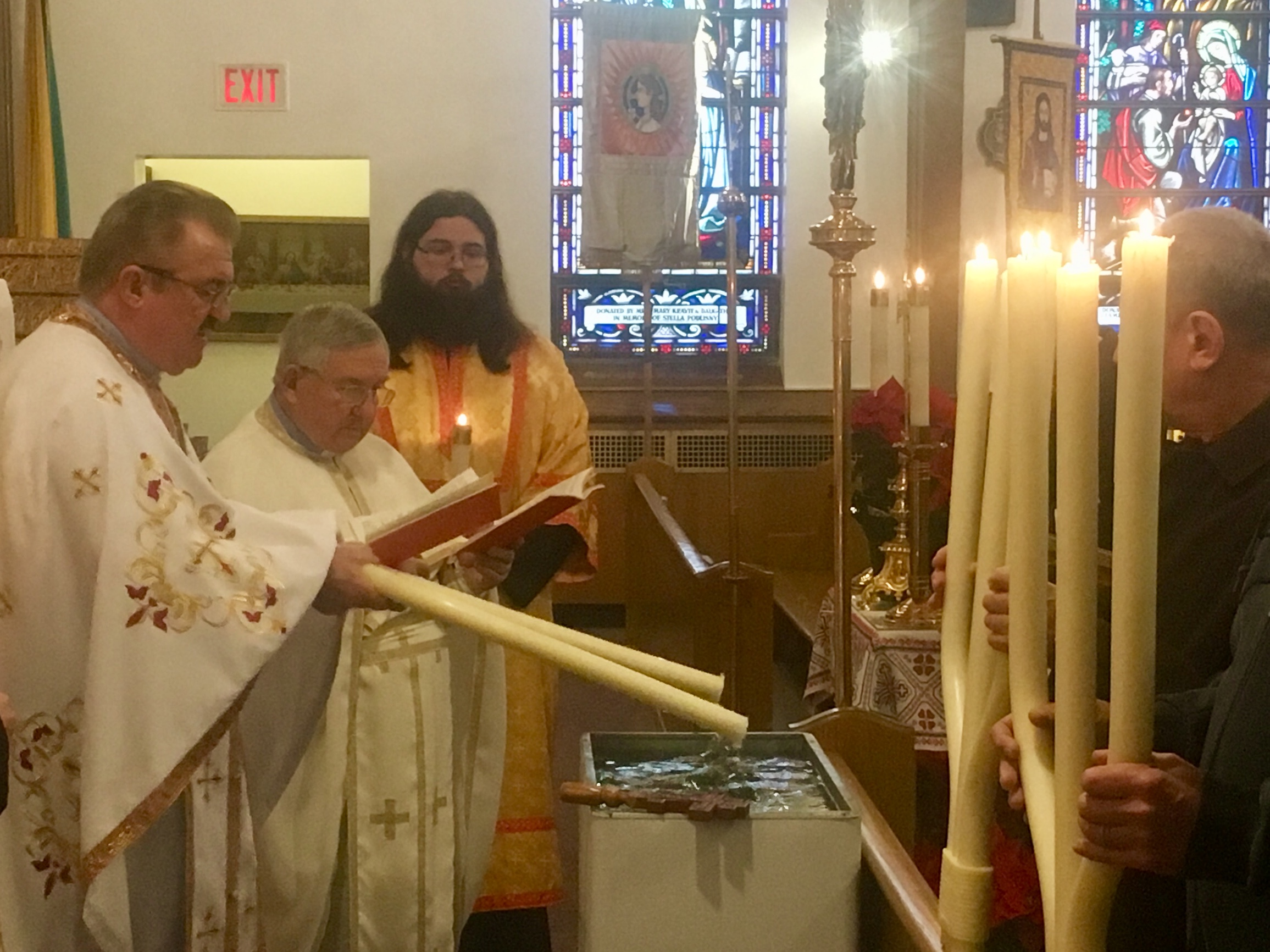
Parish announcements this week
Christ is Baptized!
THEOPHANY OF OUR LORD: At Your baptism in the Jordan River, O Lord, the worship of the Trinity was proclaimed: the voice of the Father bore witness to You by calling You “My beloved Son.” The Spirit, in the form of a dove confirmed the truth of this declaration. O Christ-God, manifested Light of the world, glory to You.
Parish Facilities Maintenance Team Formed
The organizational meeting of the newly formed Facilities Maintenance Team of St. Michael’s Ukrainian Catholic Church will take place on Friday evening, January 18th starting at 6:30 p.m. During this meeting, the team will discuss what maintenance or repair projects will be worked on during this new year. The schedule of work sessions will also be established for the entire year so that plans can be developed for doing all of the projects and arrangements made for the purchase of required supplies and equipment.
Once the projects have been determined and prioritized, the group will spend the rest of this “meeting” beginning to work on the first project. The usual time frame for the work sessions will run from 6:30 to about 9:30 p.m. There will be occasions when it is necessary to work later than 9:30 to complete some of the projects.
All parishioners who would like to become part of the team should leave your contact information with Father Iura after the Liturgy. Forms for providing your contact information can be found in the vestibule of the church.
Awakenings —Adult Faith Formation: “Always be prepared to make a defense to any one who calls you to account for the hope that is in you,”1 Peter 3:15.
Adult Faith Formation at St Michael’s strives to create an environment and opportunities that foster adult learning, addressing the varied dimensions of Byzantine Catholic life and the spiritual life. Our Byzantine tradition is rich and we aim to deepen our understanding so as to inform the way we live.
As a result of the leadership of His Beatitude, Patriarch Sviatoslav from his letter that we heard last week, we are aiming to address the hopes of the Patriarch to generate a new appreciation for the beauty of the Byzantine tradition of faith that we have inherited. Beginning now, we will offer a word from the Catechism of Ukrainian Greek Catholic Church, Christ Our Pascha and a word from one of the Fathers of the Church on a weekly basis. It is our hope that these words will awaken a new hope in the promises of our Savior, Jesus Christ, for communion with the Holy Trinity.
The Freedom of the Creator: Holy Scripture begins the account of the creation of the world with these words: “In the beginning, God created the heavens and the earth” (Gen. 1:1). God was, is, and remains always “in the beginning” of everything created, and all that comes forth in time. The evangelist John writes about God as the beginning of everything: “ ‘I am the Alpha and the Omega,’ says the Lord God, who is and who was and who is to come, the Almighty” (Rev 1:8). St. Irenaeus of Lyons writes that all things came forth from the hands of God, by the Word and the Holy Spirit. (Christ Our Pascha, 103)
In Communion: From the Christmas Sermon of St Gregory Palamas
Schedule for Holy Theophany and Julian Christmas
Schedule for Holy Theophany
on January 6 and Christmas (Julian Calendar) on January 7
Holy Theophany, January 6
9:00 a.m. Great Compline followed 10:00 a.m. Divine Liturgy and 11:15 a.m. Great Sanctification of Water
Christmas (Julian Calendar), January 7
9:30 a.m. Great Compline and 10:30 a.m. Divine Liturgy
Parish Facilities Maintenance Team Formed
The organizational meeting of the newly formed Facilities Maintenance Team of St. Michael’s Ukrainian Catholic Church will take place on Friday evening, January 18th starting at 6:30 p.m. During this meeting, the team will discuss what maintenance or repair projects will be worked on during this new year. The schedule of work sessions will also be established for the entire year so that plans can be developed for doing all of the projects and arrangements made for the purchase of required supplies and equipment.
Once the projects have been determined and prioritized, the group will spend the rest of this “meeting” beginning to work on the first project. The usual time frame for the work sessions will run from 6:30 to about 9:30 p.m. There will be occasions when it is necessary to work later than 9:30 to complete some of the projects.
All parishioners who would like to become part of the team should leave your contact information with Father Iura after the Liturgy. Forms for providing your contact information can be found in the vestibule of the church.
Scripture in the Divine Liturgy
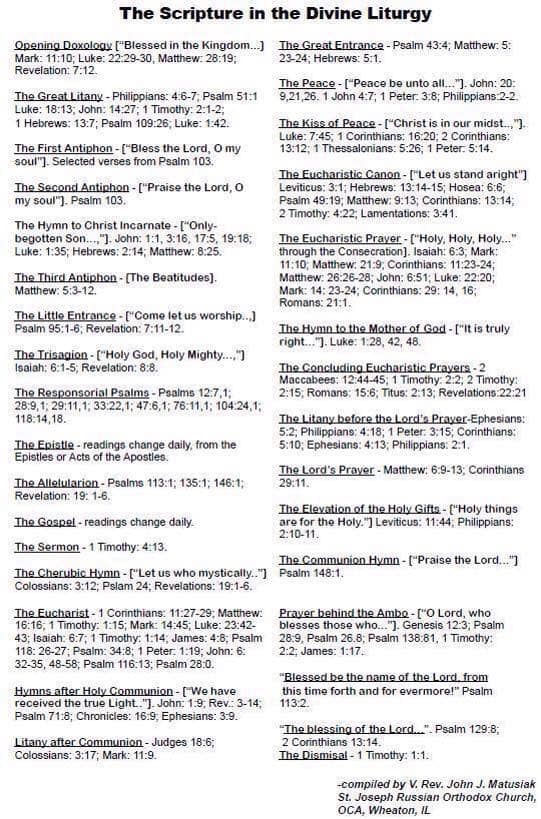
We ought to be concerned to know and appreciate the place of Sacred Scripture in our worship of God in the Divine Liturgy.
No Catholic can be ignorant of Scripture because we would be ignorant of Jesus Christ, to paraphrase St. Jerome.
Click on the image to enlarge, and perhaps print the page for your prayer book and bible.